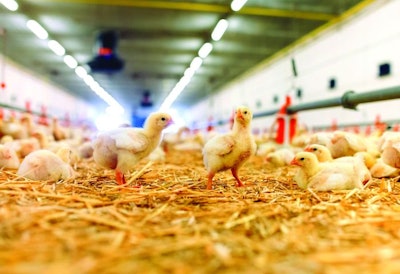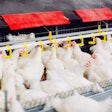
Reusing litter could help prevent the development of antibiotic-resistant Salmonella and other pathogens in broilers, revealed new research published in Applied and Environmental Microbiology.
“Reusing litter can have microbiological benefits, not just economics,” said the study's lead author Adelumola Oladeinde, a research microbiologist with the U.S. National Poultry Research Center (USNPRC) and adjunct faculty in UGA's College of Agricultural and Environmental Sciences.
“What we show in this study is that reuse can also help reduce the incidence of antibiotic-resistant Salmonella.”
Salmonella and antibiotic resistance
Salmonella in poultry is under intense scrutiny right now. The U.S. Department of Agriculture (USDA) Food Safety and Inspection Service (FSIS) recently unveiled a proposed framework to improve Salmonella control in poultry products.
The action follows previously announced efforts to reduce Salmonella associated with poultry products, with a focus on “encouraging preharvest controls to reduce Salmonella contamination coming into the slaughterhouse.” The agency also identified Salmonella as an adulterant in breaded chicken in August.
Consumers are also intensely focused on antibiotic use in poultry. Resistance, when bacteria develop the ability to defeat the drugs designed to kill them, can devastate poultry flocks and affect the livelihood of farmers. As a result, many poultry producers pledged to raise poultry antibiotic-free or with no antibiotics ever.
How litter reuse can hinder antibiotic resistance
The researchers began by infecting broiler chickens with a strain of Salmonella that was not antibiotic resistant. Half of the chickens were raised on fresh litter, while the others were raised on reused litter.
The birds raised on reused litter were less likely to test positive for Salmonella. In addition, while some of the Salmonella-infected chickens on fresh litter tested positive for a multi-drug resistant strain of Salmonella, this did not occur in the broilers on reused litter.
The research study builds on a previous discovery that found that microbes found in recycled poultry litter could improve bird health by preventing the growth of pathogens like Salmonella.
There’s still a lot to learn about reusing litter in poultry, Oladeinde said.
“We still need more research to determine what defines a good litter,” he added. “I think those are the questions that we will hopefully provide some answers to.”

















